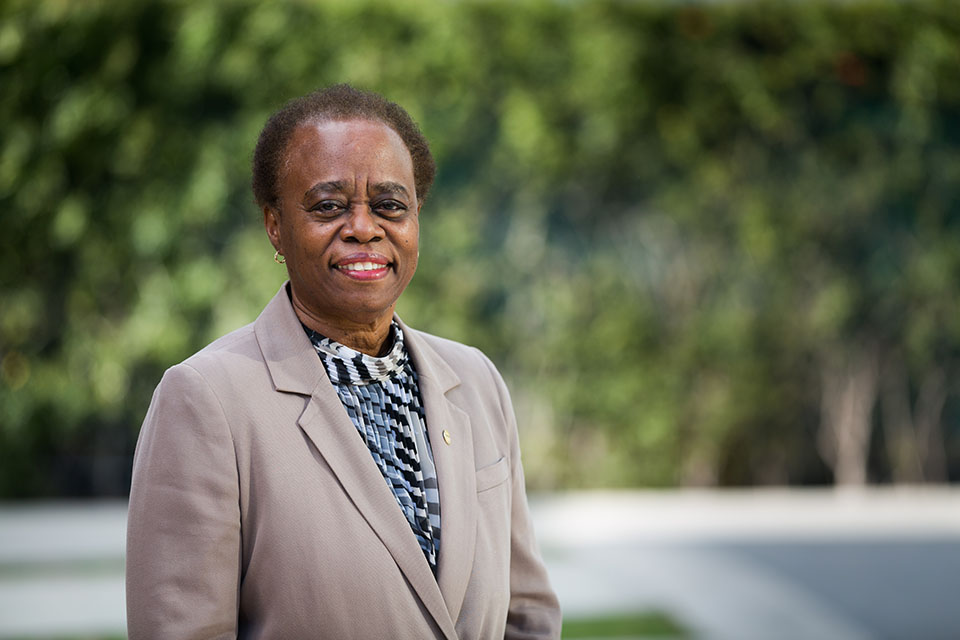
As a prominent engineer and leader in aerospace, Wanda Austin, Ph.D., has spent a good amount of time identifying UFOs. Not to be confused with weather balloons or unidentified beings, the UFOs she has faced and conquered both in career and life are: “Uncertainty, Failure, and “Oh no” – risk.”
“UFOs relate directly to complexity, and the challenge here as a leader is to embrace the complexity and not let it cause you to pause with a sense of fear or indecision,” Austin says.
At Loyola Marymount University’s spring Seaver Spotlight, Austin shared her reflections on leadership, drawn from both her professional career and personal experiences, with an audience of students, faculty, staff, and alumni. During her introduction of Wanda Austin, LMU Frank R. Seaver College of Science and Engineering Dean Tina Choe said she has tried to get Austin, an accomplished aeronautics and systems engineer, to speak at LMU for the past nine years. The cosmos finally aligned this spring.
Austin served as president and CEO of The Aerospace Corporation from 2008-2016. As the sixth president, she was the first woman and first African American president in the 57-year history of the organization. She was a member of the technical staff at Aerospace for nearly 29 years prior to leading the company. She is an award-winning engineer and mathematician who has served on many technical boards, including the Defense Science Board, the Air Force Scientific Advisory Board, and the U.S. President’s Council of Advisors on Science and Technology. More recently, she served as interim president of the University of Southern California during a crucial transition period, and co-founded MakingSpace, Inc., a systems engineering and leadership development consultancy.
Now retired, Austin took cues from her more than 40-year career and her book, “Making Space: Strategic Leadership for a Complex World,” for her presentation on the same subject, sharing insights on leading organizations and/or teams, leading through uncertainty and intentional change, decision making, tackling a complex environment to uncover and execute solutions, strategic leadership, and recognizing that while leadership can be difficult, we can all be leaders.
“Leadership makes a difference in outcomes; it is important. I encourage all of you to recognize you are a leader already,” said Austin, kicking off her presentation. “You also have the opportunity to define what kind of a leader you want to be. The key to identifying the type of leader you want to be is to keep asking questions. I know that Loyola Marymount students will have an opportunity to be in rooms today and in the future to make a difference and have an impact.”
Austin’s leadership model does not follow the typical organizational chart with the leaders at the top. “The team sits at the top of my leadership model, and the pillars that the team is looking for are innovation, talent, strategy, risk, and execution. These are things a leader can impact, which enables a team to be successful,” she said.
Her final summary shared tips for students taken from her observations and lessons on leadership. They are not unique to the aerospace industry, but rather provide food for thought for aspiring leaders at every level. Suggested strategies for leading in a complex world:
- Look around corners and anticipate change.
- Know and show your strengths, but also address your weaknesses.
- Learn from failures.
- Be curious and keep trying.
- Take measured risk to resolve complexity.
- Ask good questions; take the time to listen to the answers and execute.
“Leadership development truly is a never-ending process, and it’s a process that rewards effort. The more you put into it, the more you get out of it. Leaders must be continuous learners,” she said.
The event concluded with a Q&A session featuring Austin fielding questions from students and faculty alike from a variety of disciplines.
Austin is committed to inspiring the next generation to study the science, technology, engineering, and mathematics disciplines, and to focus on careers in science and engineering. “An educated society is the key to success,” she says. “Our country needs young men and women who are educated in STEM fields. From an economic standpoint, we don’t want to outsource opportunities for career paths that require a college degree.”
View event recording here.







